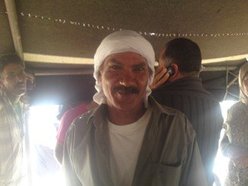That is how much water DanChurchAid and partner, East Jerusalem YMCA – Women’s Training Program have created for the Bedouins in the desert of Bethlehem.

© Matilde Sonali Holck
51 agricultural cisterns have been rehabilitated for agricultural purposes (such as drinking water for animals and irrigation of land) and 50 household cisterns have been constructed to provide clean drinking water for the families, who are otherwise not connected to a water network.
A closing ceremony for the project was held on 29 June 2011 in Mukhtar’s tent in Rashaydeh a tent placed basically in the middle of nowhere. The Mukhtar is one of the head’s of the village council in the village and he welcomed around 60 people to the ceremony among them the Minister of Turism, the Deputy of the Ministry of Agriculture and the Mayor of Bethlehem.
“Now we have water available and animals come from all over to drink” the Mukhtar said at the ceremony, and his wife “imm Mohammad” added: “The wells are very important for us. The animals are our main source of income, and it is important for them to drink.”
Main outcomes
- 20,818 cubic meters of water capacity made available through 51 agricultural cisterns
- 50 household drinking cisterns are made available with a total of 3500 cubic meters water capacity
- In total 24,318 cubic meters of water have been made available for the Bedouins saving them around 1,000,000 NIS (202,230 EUR) each year
- 40.8 days of added water capacity made available during periods when most needed
- Around 12,000 working days were created for 450 individual unskilled workers
- 600 students were reached in hygiene campaigns in the schools of Al Rashaydeh, Rawa’en and Al Obidia
- 7,680 individuals were reached in house to house hygiene campaigns
The project has benefitted around 31,500 people around Bethlehem, who used to pay up to 80 NIS (around 16 EUR) per cubic meter of water brought in by water tanks from the nearest filling point.
The project has in large parts been implemented by the Bedouins themselves as DanChurchAid (DCA) and East Jerusalem YMCA – Women’s Training Program (EJ YMCA-WTP) have paid unskilled workers to clean and plaster the, sometimes, thousands of years old cisterns – a term referred to as cash for work. This has provided much needed income for the Bedouin population, who are among the poorest in the West Bank.
“I have 100 sheep. They each drink around 8 liters of water per day. Before I brought tanks of water for them. One tank cost 300 shekel (around 61 EUR red.), but now we use the cistern for free.” Said Josef Mohammad from Rashaydeh, one of the beneficiaries of the project.
In addition to rehabilitating cisterns DCA and EJ YMCA-WTP have provided hygiene training to the families focusing on both maintenance of the cisterns and on hygiene in the households and schools. Especially the interventions in the schools have been a success and several schools have asked for more training.
DCA and EJ YMCA-WTP have just gotten a confirmation from the European Commission Humanitarian Organization (ECHO) on a similar project to be implemented in the same area 2011-2012, and Mads Lindegård, the Regional Representative from DCA emphasizes the importance of the project: “These projects are essential for the survival of the most vulnerable populations living in one of the harshest environments on the planet.”
The total project cost amounted to 628,000 EUR funded by ECHO and DCA’s own funds.
By Matilde Sonali Holck
